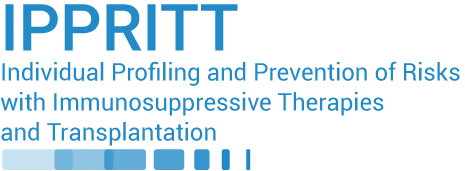Association of sirolimus adverse effects with m-TOR, p70S6K or Raptor polymorphisms in kidney transplant recipients.
Abstract
BACKGROUND: The mammalian target of rapamycin (m-TOR) inhibitor sirolimus is an immunosuppressive drug used in kidney transplantation. m-TOR binds with Raptor and phosphorylates p70S6 kinase, a protein involved in numerous cell signalling pathways. We examined the association of candidate polymorphisms in m-TOR, Raptor and p70S6K, sirolimus dose and exposure, and other time-independent as well as time-dependent covariates, with sirolimus-induced adverse events in kidney transplant recipients. METHODS: This study included a first group of 113 patients, switched from a calcineurin inhibitor to sirolimus, and a validation group of 66 patients from another clinical trial, with the same immunosuppressive regimen. The effects of gene polymorphisms and covariates on the total cholesterol, LDL cholesterol, triglycerides, haemoglobin, cutaneous adverse events, oedemas and infections were studied using multilinear regression, or logistic regression imbedded in linear mixed-effect models. RESULTS: An m-TOR variant haplotype was significantly associated with a decrease in haemoglobin levels in the two populations of patients (discovery group: β=-0.82 g/dl, P=0.0076; validation group: β=-1.58 g/dl, P=0.0308). Increased sirolimus trough levels were significantly associated with increased total cholesterol levels (discovery group: β=0.02 g/l, P<0.0001; validation group: β=0.02 g/l, P=0.0002) and triglyceride levels (discovery group: β=0.02 g/l, P=0.0059; validation group: β=0.05 g/l, P=0.0370). Sirolimus trough levels were also associated with an increased risk for cutaneous adverse events [odds ratio=1.97, 95% confidence interval (1.32-1.94), P=0.0009] and oedemas [odds ratio=1.16, 95% confidence interval (1.03-1.30), P=0.01342] in the discovery group, but this was not confirmed in the validation group. CONCLUSION: These results provide evidence of an association between an m-TOR haplotype and a decrease in haemoglobin in renal transplant recipients.
Fichier principal
 Woillard_et_al_PGgenomics_Revised_version2_cleancopy.pdf (272.38 Ko)
Télécharger le fichier
inserm-00724758_edited.pdf (216.71 Ko)
Télécharger le fichier
Woillard_et_al_PGgenomics_Revised_version2_cleancopy.pdf (272.38 Ko)
Télécharger le fichier
inserm-00724758_edited.pdf (216.71 Ko)
Télécharger le fichier
Origin : Files produced by the author(s)
Origin : Files produced by the author(s)



